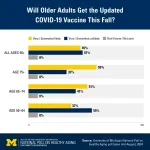(Press-News.org) The UK Government’s policy to scrap Winter Fuel Payments could disproportionately affect low-income pensioners in England, new analysis suggests. But the same study argues that the energy inefficiency of homes and challenges involved in downsizing will have an even more harmful effect this winter.
The study, published in Energy Research and Social Science, was completed shortly before the Winter Fuel Payment vote was taken, by researchers from the University of Cambridge and Delft University of Technology (TU Delft).
The researchers raise particular concerns about the impact of the policy on pensioners with annual incomes of between £11,300–£15,000 for single pensioners and £17,300–£22,000 for couples.
Drawing on data from the English Housing Survey, which sampled nearly 12,000 households across all income groups, the study investigated how income, energy efficiency, home size, household type, and tenure status impacted on energy expenditure.
The researchers found that an increase of £1 per year in income (after housing costs, tax and welfare payments) was associated with a marginal increase in heating spending of about one-tenth of a penny.
The study also found that just a small energy efficiency improvement – a one-point increase in the SAP12 rating (The Government's Standard Assessment Procedure for Energy Rating of Dwellings – had a major impact on households in energy poverty, offering an average reduction in annual heating costs of £21.59 per year.
Floor area also had an impact. The researchers found that a one square metre increase was associated with an annual increase in heating spend of £5.04 per year, for households facing energy poverty, making this the worst affected group. This compares with £4.18 per year for high-income households, £3.65 per year for low-income households, and £2.99 per year for very low-income households not in energy poverty.
“When low-income households receive more income, they generally spend a little more to warm their homes. But these households often have to spread any extra money they have across other essential needs including food,” said lead author, Dr Ray Galvin, affiliated with Cambridge Institute for Sustainability Leadership (CISL).
“A reduction in income like the loss of the Winter Fuel Payment could force low-income pensioners to cut back not only on heating but also on other basic necessities. This poses a significant risk to people who are particularly vulnerable to the effects of living in cold homes.”
Energy efficiency
Across all household types, the researchers found that the energy efficiency of the dwelling had by far the biggest impact on heating expenditure.
“The most effective strategy to warm up the homes of people living energy poverty is to increase the energy performance of their dwellings,” said Professor Minna Sunikka-Blank, from Cambridge’s Department of Architecture.
Specifically, the authors advise that the SAP12 rating of homes need to be increased to at least 72.
Each increase in SAP12 energy efficiency rating corresponds to a reduction in heating costs of around £20 per year, meaning that for households in energy poverty, with an average SAP12 rating of 59.48, increasing the rating to the level of low-income households not in energy poverty, 71.45, could reduce heating costs by about £240 per year.
The authors make clear that energy savings would not be sufficient to pay for these energy-efficiency upgrades. They would require targeted financial support.
Dr Galvin said: “Government and society may well find that these costs are paid back to the country through co-benefits of fewer days off work, longer lives and less strain on the health service.”
While this would not improve the finances of households in energy poverty as much as the direct monetary allowances such as the Winter Fuel Payment, it would, the authors argue, make a substantial, direct impact on cold, unhealthy homes.
Dr Galvin said: “There needs to be extra focus on developing policies for the long-term solution of retrofitting energy-inefficient homes. This can provide enduring reductions in energy bills while also improving thermal comfort. This approach may also align better with the goal of reducing carbon emissions and tackling climate change.”
Prof Minna Sunikka-Blank said: “Without retrofit initiatives, energy poverty will persist in the UK, because in low-income households immediate needs often take precedence over thermal comfort, even when incomes increase.”
Home size
The study found that households in energy poverty have a 7.3% larger average floor area than low-income households not in energy poverty, and that floor area makes a substantial difference to heating energy costs (about half to two-thirds the impact that the SAP12 energy efficiency rating has).
Tijn Croon, from TU Delft said: “These findings suggest that inability to downsize may be a significant driver of energy poverty in the United Kingdom. Low-income households can save money and stay warmer living in smaller homes but downsizing is not always easy for older households whose dependants have left home and who find themselves with a large, older home that is very expensive to keep warm.”
One-person households spend less on heating
A surprising finding in the study is that across all income groups, one-person households tend to spend less on energy. And for households in energy poverty the reduction (£36.77 per year) was twice as large as for low-income households not in energy poverty (£15.65 per year).
Tijn Croon, from TU Delft, said: “This might suggest that many one-person households are able to control their energy consumption more strategically than a multi-person household can.”
Dr Galvin said: “Our study controlled for other factors so this is not just a case of low-income households living in smaller homes. Further research could survey one-person households to find out if they have skills and practices that could be transferred to multi-person households.”
Mitigating impact of Winter Fuel Payment cuts
The authors suggest several potential solutions. Expanding Pension Credit eligibility to align with the government's low-income threshold would be the most comprehensive fix, though this may be financially unfeasible. Alternative measures could include a temporary application process for the Winter Fuel Payment for those just above the Pension Credit threshold or providing tax credits or rebates for low-income pensioners, which could be more easily managed since HMRC already holds income data.
While much attention has been given to the risk of energy poverty among pensioners, the authors also note that families with children and young adults are often equally vulnerable and may face even greater challenges in the housing market compared to pensioners.
The authors are currently working on a follow-up research paper that will explore the recent reforms to the government’s Warm Home Discount scheme.
Reference
R. Galvin, M. Sunikka-Blank, T. Croon, ‘Juggling the Basics: How Much Does an Income Increase Affect Energy Spending of Low-Income Households in England?’, Energy Research and Social Science (2024). DOI: 10.1016/j.erss.2024.103766
Media contacts
Tom Almeroth-Williams, University of Cambridge: researchcommunications@admin.cam.ac.uk
Dr Ray Galvin: rg445@cam.ac.uk
END
Energy inefficiency and inability to downsize pose even bigger threat to low-income pensioners than loss of Winter Fuel Payments, Cambridge study suggests
2024-09-23
ELSE PRESS RELEASES FROM THIS DATE:
Innovative model provides valuable insights into prostate cancer spread
2024-09-23
A new preclinical model using CRISPR, an advanced technology that allows scientists to cut and edit genes, has given Weill Cornell Medicine researchers and their colleagues a deeper insight into how prostate cancer spreads or metastasizes.
In the study, published Sept. 23 in Cancer Discovery, scientists charted the complicated routes prostate cancer metastatic cells take as they travel through the body.
“Using virtual maps, we can reveal the hidden highways of metastases, one day guiding us towards novel therapies that could act as roadblocks for cancer,” ...
NIH awards $27M to establish new network of genomics-enabled learning health systems
2024-09-23
The National Institutes of Health (NIH) is awarding $5.4 million in first-year funding to establish a new program that supports the integration of genomics into learning health systems.
Present in many hospitals across the United States, learning health systems are a type of clinical practice that bridges research and patient care. These systems use a variety of methods to continually analyze patient data. Clinicians then use the results of those analyses to refine practices and improve future care.
The new Genomics-enabled Learning Health System (gLHS) Network aims ...
People prefer to work with higher-paid colleagues
2024-09-23
When given the choice, people prefer to collaborate on work projects with higher-paid colleagues, but they want to hire subordinates with a lower pay history than theirs, according to research published by the American Psychological Association.
The research, published in the journal American Psychologist, aimed to explore how a trend toward increasing pay transparency in the business world may affect workers’ behavior.
“I've long been interested in the ways in which slight -- and not-so-slight -- differences in salaries can generate strong ...
Deeper corals may help shallow reefs recover in the Florida keys
2024-09-23
Since the 1970s, coral reefs in the Florida Keys National Marine Sanctuary (FKNMS) have experienced catastrophic declines in coral cover, with as much as a 50% reduction between 1998 and 2011 alone. Although coral reefs within the FKNMS have been heavily studied, research in the mesophotic zone, which extends from about 100 to 500 feet deep, has historically been more limited in this region.
Mesophotic coral ecosystems have the potential to be buffered from anthropogenic stressors due to their depth and/or relative isolation from ...
Why saying you’ll ‘never retire’ may be a warning sign
2024-09-23
COLUMBUS, Ohio – Americans who say they expect to “never retire” are more likely than others to score low on a measure of financial knowledge, a new study shows.
In a national survey, 20% of those who missed all three financial knowledge questions said they expected they would never retire, compared to 12% who answered all questions correctly, who said they’d likely work well past retirement age.
The study also found that those who were overconfident in their financial knowledge (and those whose low levels of confidence ...
Study reveals high rates of seafood mislabeling and ambiguous market names in Calgary, Alberta, highlighting species of conservation concern
2024-09-23
A new peer-reviewed study published in PeerJ Life and Environment has uncovered alarming levels of seafood mislabeling and the use of ambiguous market names in Calgary's seafood market, often concealing species of conservation concern. This research marks the first Canadian study to investigate both invertebrate and finfish mislabeling and the implications of unclear market names.
The study, titled "Mislabeled and Ambiguous Market Names in Invertebrate and Finfish Seafood Conceal Species of Conservation ...
COVID-19 hits older adults hardest; which ones want the updated vaccine?
2024-09-23
The newly updated COVID-19 vaccine just arrived in pharmacies and clinics nationwide, and a new poll suggests nearly half of people age 50 and older plan to get it. But some older adults with high risk of severe illness appear unlikely to seek the vaccine, and interest varies widely by age group, education level, race and ethnicity, and other factors, the poll shows.
In all, 45% of people age 50 and older say they’re likely to get the updated vaccine, according to the new findings from the University of Michigan’s National Poll on Healthy Aging. The data come from polling done in August 2024, just before the new vaccine was released but ...
Mental health issues are a common phenomenon in elite sport
2024-09-23
Nearly three-quarters of Dutch elite athletes and forty percent of their coaches report sport-related distress. This is one of the findings from a study conducted by Amsterdam UMC together with NOC*NSF, the organisation which represents the Dutch Olympic Committee and the Dutch Sport Federation, published today in BMJ Open Sport & Exercise Medicine.
The most common mental health problem among athletes and coaches is report sport-related distress (73% and 41%, respectively). Unfavorable alcohol consumption that can negatively affect sports performance is also common (52% and 53%). In athletes, ...
New insights into intellectual disability genetics emerge at Mount Sinai
2024-09-23
New York City (Sep 24, 2024) – Researchers at the Icahn School of Medicine at Mount Sinai have published a pivotal study in Nature Genetics (DOI: 10.1038/s41588-024-01917-1) that sheds light on a novel genetic variant associated with intellectual capacities and educational outcomes. This discovery offers new insights into intellectual disability diagnostics and potential therapeutic avenues.
The study reveals the significant impact of tandem repeats—sequences of DNA where a pattern of nucleotides is repeated multiple times in a head-to-tail manner on a chromosome—on intellectual functioning.
"The ...
Older people are more swayed by the impulsive actions of others when making financial decisions – new study reveals
2024-09-23
Older people are more likely to be influenced by the impulsive financial preferences of others than their younger counterparts, according to a new study.
Research lead by psychologists at the University of Birmingham and the University of Oxford published today in Communications Psychology, reveals that people aged 60 and over are more prone to being influenced by other people when it comes to making impulsive financial decisions compared to young adults aged between 18 -36.
The study set out to explore delayed gratification and how our willingness to wait and social influence develop and differ across our lifespan. To test how age ...




